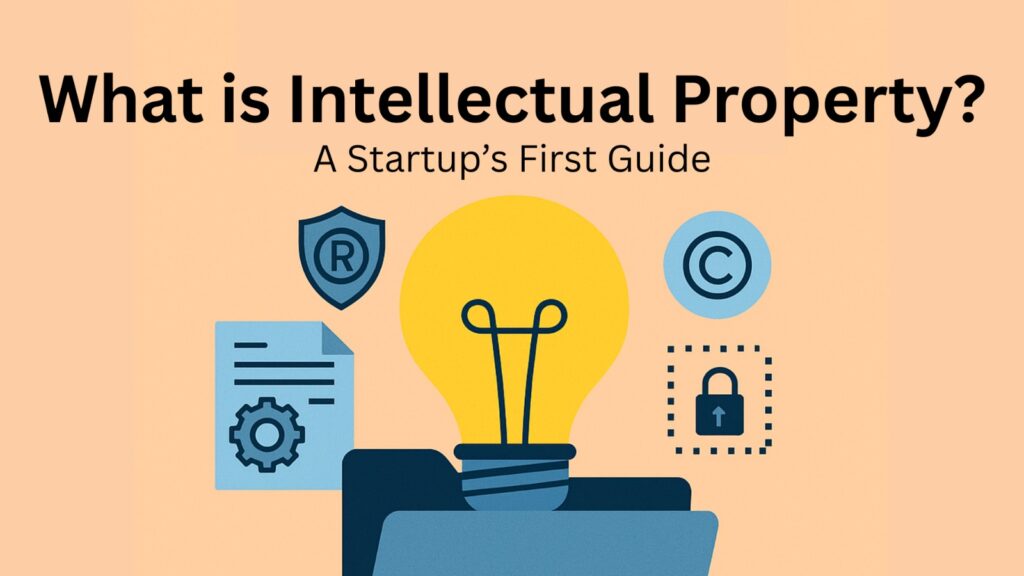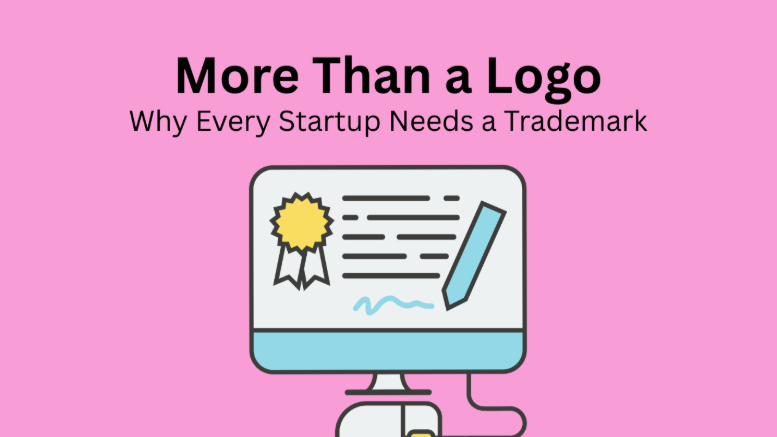What is Intellectual Property?
If you’ve ever said, “I can’t tell you more until you sign an NDA,”
congrats—you’re already thinking about intellectual property (IP), even if you didn’t know it.
IP isn’t just something for lawyers in suits or massive corporations. It’s for every founder to sketch ideas on a whiteboard, coding through the night, or building a brand that means something. In fact, your startup likely owns more IP than you realize.
Let’s break it down. IP covers all the “invisible assets” your startup is creating, like:
- Your app’s source code
- That perfect product name
- Your clever-as-hell tagline
- The pitch deck you obsessed over
- A custom tool you built to solve a problem
- And yes, even that algorithm you keep guarded like your grandmother’s secret recipe
These assets may be intangible, but they’re insanely valuable—and dangerously easy to copy if you don’t lock them down.
Meet the Big Four: The Main Types of IP (With Stories You’ll Remember)
1. Patents: Innovation’s Bodyguard
What it protects: new inventions, processes, tech, or improvements that are novel, useful, and non-obvious.
Why it matters:
Back in 2009, a little-known startup called Nest Labs filed patents for a thermostat that learned from user behavior. Fast forward a few years ago, Google scooped them up for $3.2 billion. Why? Sure, the tech was cool—but the patents made it valuable and defensible.
For You:
If you’re building something that solves a problem in a new way—hardware, software, a method, or even a unique process—consider filing a provisional patent early. It gives you time to refine the idea while holding your spot in line.
2. Trademarks: Your Brand’s Armor
What it protects: Names, logos, taglines, sounds, colors—basically your brand identity.
Startup Story:
Ever seen “Wow no cow!” on an oat milk carton? That’s Oatly—a startup that trademarked not just their name but their quirky slogans and packaging too. That move turned their branding into IP—and helped them dominate supermarket shelves (and minds).
Why it matters:
Launching with a name you didn’t clear can cost you a lot—think lawsuits, rebrands, and shattered momentum. Protect your brand before someone else does.
3. Copyrights: The Silent Guardian of Your Creativity
What it protects: Original works—like your code, website copy, videos, UI design, marketing content, and more.
Example:
Think about Spotify—they don’t just rely on music licensing. Their recommendation algorithms, playlists, and interface text are also protected by copyright. That sleek animation your designer made? Yep, that’s copyrightable.
Pro Tip:
You technically get copyright when you create the work, but registration is what gives you legal leverage in case of infringement.
4. Trade Secrets: Your Private Superpower
What it protects: Confidential info—formulas, client lists, strategies, growth hacks, internal tools.
Case in Point:
The infamous Google vs. Uber/Waymo case showed what happens when trade secrets go rogue. One engineer allegedly downloaded 14,000 confidential files before jumping ship. It ended in a $245 million settlement. Ouch.
Startup Tip:
Don’t just say something’s a trade secret—treat it like one. Lock it down with NDAs, internal access controls, and staff training.
Why Startups Should Care About IP—Now, Not Later
Imagine this: You’re pitching to investors. They’re into your product. Then they ask:
“What’s stopping someone else from copying this?”
And you say:
“Well… we were first to market?”
That’s not a moat—it’s a puddle.
Here’s why IP needs to be part of your strategy early:
- It builds investor confidence—they want to know you own what you’re building.
- It’s both a sword and a shield—you can enforce your rights and license them, too.
- It boosts valuation—especially if you’re in tech, SaaS, D2C, or anything creative.
- It gives you leverage in partnerships, funding, and exits.
Rookie Mistakes We See All the Time (Don’t Be That Startup)
- Filing patents after publicly launching
- Choosing a name without a trademark search
- Forgetting to assign IP rights from freelancers or ex-cofounders
- Oversharing proprietary ideas on Twitter or at meetups
- Telling yourself, “We’ll deal with IP later”
And the killer?
Letting individuals—not the company—own the IP. That one can destroy acquisition deals and make investors walk. Always get IP assignments in place early.
Your Startup IP Checklist
- Audit your IP—what have you actually created?
- Check trademarks before naming anything
- File a trademark application for your name/logo
- Consider a provisional patent if you’re innovating
- Use NDAs with collaborators, devs, and advisors
- Ensure all employees/contractors sign IP assignment agreements
- Talk to an IP expert (that’s us—we’re happy to chat)
Ideas are cheap. Executing them is hard. But protecting them? That’s what makes them yours.
In the startup world, every unfair advantage counts—and a strong IP foundation could be the thing that separates your brand from the “next big idea” that didn’t make it.
At RAS Intellect, we help founders protect what they’re building—and plan for growth with the right IP tools in place. Whether you are pre-launch or scaling fast, we’re here to make sure your assets are protected, and your story is defendable.





